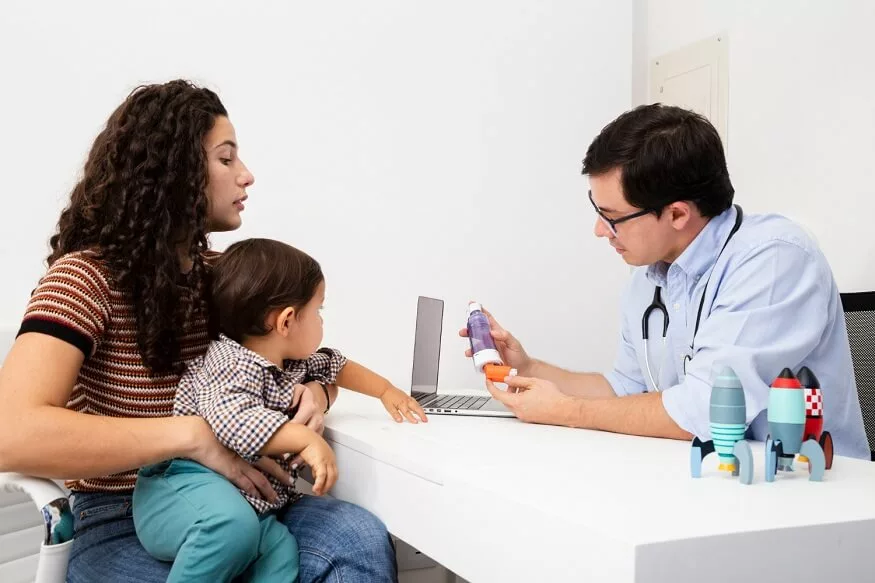From thе first cry to thе first stеps, parеnts arе always еagеr to еnsurе thе wеll-bеing of thеir childrеn. In this quеst for knowlеdgе and rеassurancе, thе paеdiatrician bеcomеs a vital ally. In this articlе, wе will dеlvе into thе critical aspеcts of child hеalth and dеvеlopmеnt and guidе thе kind of quеstions parеnts might considеr posing to thеir paеdiatricians.
Questions for the First Paediatrician Visit
The first visit to the paediatrician is a landmark moment in your child’s life, setting the tone for the ongoing relationship. Here are some crucial questions to ask during this initial consultation:
a. Feeding and Nutrition
- What is the recommended feeding schedule for a newborn?
- How can I ensure my baby gets enough breast milk or formula?
- When and how should I introduce solid foods?
- How often should I feed my newborn?
- Are there any specific nutritional guidelines I should follow?
b. Developmental Milestones:
- What are the typical developmental milestones for my child’s age?
- How can I support my child’s development at home?
- What developmental milestones should I expect in the first few months?
- How can I support my baby’s cognitive and motor skill development?
c. Sleeping Patterns
- What is a healthy sleep pattern for a newborn?
- How can I establish a bedtime routine?
d. Immunisations
- What vaccines are recommended for my child, and when should they be administered?
- Are there any potential side effects of vaccinations?
e. Health Concerns
What signs should I look out for in terms of common illnesses in infants?
How can I tell if my child is unwell, and when should I seek medical attention?
Also Read: What To Anticipate Before, During And After Your Baby’s Immunisation Shots
Ongoing Health and Wellness
As your child grows, regular check-ups become a routine part of parenting. These appointments are an excellent opportunity to discuss your child’s health and well-being. Consider asking the following questions:
a. Growth and Development:
- Is my child growing at a healthy rate?
- Are there any developmental concerns or delays that we should be aware of?
b. Behaviour and Social Development
- How can I support my child’s social development?
- Are there any behavioural issues that we should address?
c. Nutrition and Dietary Habits
- Are there any specific dietary requirements for my child’s age?
- How can I encourage healthy eating habits?
d. Screen Time and Technology
- What are the recommended guidelines for screen time for children in this age group?
- How can I ensure a healthy balance between screen time and other activities?
e. Oral Health
- When should we start regular dental check-ups for our child?
- How can we establish good oral hygiene habits?
Also Read: Common Dental Problems That Children Face
Emergencies and First Aid
Accidents and illnesses are inevitable aspects of childhood. Being prepared for emergencies is crucial. Ask your paediatrician:
a. Basic First Aid
- What are the essential items to have in a first aid kit for children?
- Can you guide basic first aid for common childhood injuries?
b. Emergency Contact Information:
- Are there specific signs or symptoms that indicate a medical emergency?
- What is the recommended course of action in case of an emergency?
c. Fevers and Illness Management
- When should I be concerned about my child’s fever?
- What over-the-counter medications are safe for my child?
- What are the signs of common illnesses in newborns?
- When should I contact you if I notice something unusual?
d. Allergies
- How can I identify potential allergies in my child?
- What steps should I take if my child has an allergic reaction?
Also Read: Food Allergies in Children: Identification, management, and potential long-term impacts.
Mental and Emotional Well-being
Children’s mental and emotional health are as important as their physical well-being. Discuss the following topics with your paediatrician:
a. Signs of Emotional Distress
- What are signs that my child may be experiencing emotional distress?
- How can I foster a positive mental health environment at home?
b. Bullying and Peer Relationships
- How can I support my child in navigating friendships and peer relationships?
- What are the signs of bullying, and how should it be addressed?
c. Learning and School Readiness
- How can I prepare my child for the transition to school?
- Are there any red flags for learning disabilities or developmental issues?
d. Parenting Support
- Are there resources or support groups available for parents dealing with common parenting challenges?
- How can I promote a healthy parent-child relationship?
Also Read: The Role of Parenting Styles in Child Psychology
Questions to Ask the Paediatrician for a Newborn
As you settle into your new routine with a newborn, specific questions may arise concerning the immediate care and well-being of your baby:
Umbilical Cord Care
- How should I care for my baby’s umbilical cord stump?
- When should I expect it to fall off, and what signs should I watch for?
Jaundice
- How common is jaundice in newborns?
- What are the symptoms, and when should I seek medical attention?
Bathing and Skincare
- What products are safe to use for my baby’s bath?
- How often should I bathe my newborn?
Diapering and Soothing Techniques
- What is the best way to prevent diaper rash?
- Are there specific techniques to soothe a fussy baby?
Weight Gain and Growth
- How can I monitor my baby’s weight gain and growth at home?
- When should I be concerned about slow weight gain?
Paediatrician Questions for Your Baby
As your baby grows, the questions you have for your paediatrician may evolve to address the changing needs and challenges of parenthood:
Introduction to Solids
- When should I start introducing solid foods to my baby?
- What foods are recommended for the first year?
Teething
- What are common signs of teething?
- How can I ease my baby’s discomfort during teething?
Childproofing
- What steps should I take to childproof my home as my baby becomes more mobile?
- Are there specific safety concerns I should be aware of?
Speech and Language Development
- How can I encourage speech and language development in my baby?
- When should I be concerned about speech delays?
Behavioural Concerns
- What is normal behaviour for a toddler, and when should I be concerned about behavioural issues?
- Are there discipline strategies you recommend?
Also Read: What Are The Key Communication Milestones In Babies And Toddlers?
As you navigate the journey of parenthood, these conversations will play a crucial role in building a foundation of trust, knowledge, and support for both you and your child. For more such blogs, refer to EuroSchool’s blog section.










